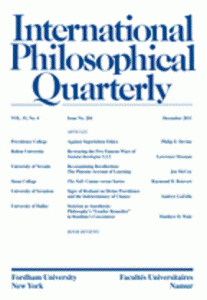Hegel, Davidson, and the Dialogical Character of Knowledge
This paper scrutinizes the dialogical character of knowledge from the perspectives of Hegel’s and Davidson’s philosophies. First, it outlines their analogous trains of thought, particularly their “anti-representational” and “intersubjective” accounts of knowledge. Second, it draws a parallel between the two by discussing their contrasting views of the structure and goal of knowledge, showing that while Davidson advocates an open-ended, scheme-less empirical knowledge, Hegel maintains the notion of a (universal-rational) scheme and a goal-oriented dialectical process in which “the true is the whole.” This section then critically traces their underlying disagreement to their divergent views on the nature of meaning, language, and thought. Finally, it argues that their views can be seen as complementary to two versions of dialectic, showing that while Hegel’s approach, akin to Platonic dialectic, focuses on the self-contained and “Truth”-oriented “negotiational” movement of ideas, Davidson’s, reminiscent of Socratic elenchus, emphasizes the truth-oriented ‘conversational’ interaction of subjects exchanging concepts.
Title: Hegel, Davidson, and the Dialogical Character of Knowledge
Author: Mohammadreza Esmkhani, Seyed Masoud Hosseini
Journal: International Philosophical Quarterly
Publication Date: March 22, 2024




دیدگاه خود را ثبت کنید
تمایل دارید در گفتگوها شرکت کنید؟در گفتگو ها شرکت کنید.